
Last year, I had the privilege of championing the Hunting Trophies (Import Prohibition) Bill in the House of Commons. This Bill aimed to deliver on the Conservative Party 2019 manifesto commitment to ban imports from trophy hunting of endangered species. It passed through the Commons unanimously and polls show is very popular with the public but ultimately it fell in the House of Lords due to lack of time, following wrecking efforts by a small minority of Peers.
However, a new Private Member’s Bill, identical to last year’s Bill, was introduced by John Spellar MP (Labour) and awaits its second reading in the House of Commons on 22nd March. It’s vital that the Government supports this Bill to help take imperilled species like elephants and leopards out of hunters’ cross-hairs.
Opinion polls consistently show that over 80 per cent of voters support an end to the import of hunting trophies, this figure rises to over 90 per cent of those who voted Conservative in 2019. This level of public support is no surprise to me or many of my fellow Conservative MPs. Our inboxes overflow with emails from constituents about animal welfare issues. Protecting animals from cruelty is part of our national identity and a 2022 poll showed that 72 per cent of voters want the UK Government to pass more laws to improve animal welfare. Trophy hunting goes against our values as a self-proclaimed ‘nation of animal lovers’.
Trophy hunting causes immense suffering. Numerous studies indicate that over half the animals shot by trophy hunters, who are often inexperienced, do not die instantly but instead have slow and painful deaths. Studies also show that trophy hunting adds to and amplifies a long list of threats faced by endangered species, such as climate change and habitat loss. Targeting, as hunters typically do, dominant animals from elephant or lion populations can have a devastating effect, removing key animals from the gene pool or interrupting complex social and territorial structures.
Claims from the pro-hunting lobby that trophy hunting is a necessary evil simply don’t withstand scrutiny. Arguments that trophy hunting’s ‘pay-to-slay’ model benefits communities and conservation are at best highly disputed and at worst dangerously inaccurate, as evidenced by a letter from 103 African experts and community leaders urging the House of Lords to support a full ban. The letter highlights that the vast majority of funds generated by trophy hunting never reach conservation programmes or communities, and that such funds are negligible compared to the damage caused through the irreversible loss of key natural resources. Conservationists who defend trophy hunting state that it can benefit conservation when ‘well-managed’, but this overlooks the fact that the industry is plagued by mismanagement[8] due to inadequate data and unsustainable hunting quotas, all underpinned by serious problems with transparency and governance.
The argument that a ban on hunting trophy imports is neocolonial or that it dictates to other countries how they should manage their conservation policies is absurd. We are a sovereign nation and we are entitled to refuse to support the suffering of animals, to refuse to put more pressure on already endangered species, and to refuse to trade in the body parts of animals who have been killed for fun. This Bill is about our values and borders.
I therefore urge the Government to support the Bill on 22nd March and to ensure that enough time is secured for the completion of all stages so that it can make it on to the statute book before the general election.
Henry Smith MP



